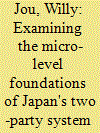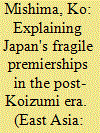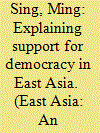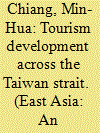|
|
|
Sort Order |
|
|
|
Items / Page
|
|
|
|
|
|
|
| Srl | Item |
| 1 |
ID:
117036


|
|
|
|
|
| Publication |
2012.
|
| Summary/Abstract |
A consensus exists among political scientists and the media that a two party system has become firmly established in Japan, and power alternation following the 2009 House of Representatives election seemed to confirm this trend. In contrast, in this study I draw on both election and public opinion data to illustrate that Japan's two-party system rests on fragile micro foundations, particularly since the change of government, and may therefore not constitute a stable equilibrium. Specifically, the two-party system is sustained by the logic of competition in single member districts, but lacks strong backing among a large proportion of the public. Evidence in support of this argument include 1) decreasing vote shares for both the Liberal Democratic Party and the Democratic Party of Japan in the 2010 House of Councillors election, and 2) a weakening relationship between support for these two parties in monthly polls, in contrast to previous years when LDP and DPJ ratings mirrored one another. I discuss some potential implications of these developments, such as the growing prominence of regional parties and prospects for electoral rule changes.
|
|
|
|
|
|
|
|
|
|
|
|
|
|
|
|
| 2 |
ID:
117037


|
|
|
|
|
| Publication |
2012.
|
| Summary/Abstract |
After Prime Minister Junichiro Koizumi's highly successful rule, Japan saw the five short-lived premierships - Shinzo Abe, Yasuo Fukuda, Taro Aso, Yukio Hatoyama, and Naoto Kan - over the period of five years (2006-11). This article aims to identify the causes of this unusually high frequency of Japan's leadership changes in recent times. Specifically, it finds that all post-Koizumi prime ministers lost power after a short tenure by following the same pattern of demise that was characterized by a rapid fall of approval rate in the media's polls. It argues that they fell into this pattern of failure for the same three reasons: their failure in economic policy; their poor leadership ability derived from the vanishing of the traditional career path to premiership; their unstable intraparty foothold caused by the transition from candidate-centered election to party-centered election. It argues that the politics under the Koizumi and post-Koizumi cabinets share important undercurrents despite their apparent differences.
|
|
|
|
|
|
|
|
|
|
|
|
|
|
|
|
| 3 |
ID:
117034


|
|
|
|
|
| Publication |
2012.
|
| Summary/Abstract |
This paper aims to explain public support for democracy in six East Asian societies using the 2006 AsiaBarometer data. The project investigates whether East Asians' support for democracy is primarily based on perceived political performance, such as satisfaction with human rights, or perceived economic performance. The work also examines whether East Asians' support for democracy is constrained by traditional values or the postmodern value of post-materialism. The analysis shows that for three democracies, satisfaction with human rights, i.e. perceived political performance and an intrinsic value embodied in democracy, counts more in shaping public support for democracy than perceived economic performance. Because support based on perceived economic performance is more volatile than support based on firm commitment to human rights, this finding sheds positive light on the prospects for democratic stability for the three East Asian democracies. For three East Asian autocratic societies, democratic support is based more on perceived economic rather than political performance, casting a pall on the future prospects for democratization of them. That said, these dim prospects are balanced by the finding of very weak and negative effects of some traditional Asian values on democratic support.
|
|
|
|
|
|
|
|
|
|
|
|
|
|
|
|
| 4 |
ID:
117038


|
|
|
|
|
| Publication |
2012.
|
| Summary/Abstract |
2004 was the year when the Japanese public's affinity with China dropped dramatically, to 37.6 %, due to anti-Japan riots in China. Now more than 70 % of the Japanese public does not feel an affinity with China. How could such a strong anti-Chinese sentiment influence Japan's policy toward China? This paper considers this question by examining Japan's decision-making process on terminating the much-criticized yen loans to China. Yen loans are a type of Official Development Assistance (ODA) provided by the Japanese government to countries lacking sufficient funds for economic development. China is one of the top yen loan borrowers, and the loans have contributed to China's economic growth and increasing openness. However, in March 2005, Japanese Foreign Minister Nobutaka Machimura told Chinese Foreign Minister Li Zhaoxing that Japan intended to phase out the yen loans before the 2008 Beijing Olympics and reached an agreement on the matter. Two-and-a-half years later, Japan terminated its yen loans to China, as the foreign ministers had agreed. Through mainly firsthand documents and interviews with government officials, this paper will clarify the following two points: (1) While it is true that the Japanese government significantly reduced its yen loan package to China from 2001 onward due to domestic criticism of China, as pointed out by previous studies, it was not planning to terminate the yen loans as of summer 2004. Instead, the Japanese government was contemplating how to keep providing yen loans to China; (2) Foreign Minister Nobutaka Machimura, who was appointed in September 2004, had pushed for the termination of yen loans to China only after anti-Chinese sentiment rose dramatically in summer 2004, because he felt that continuing the much-criticized yen loans would not benefit stable Japan-China relations. This paper sheds light on the background of the termination of yen loans to China, a major milestone in postwar Japan-China relations that had been unclear until now. Having said this, the more important point of this paper may be that it also shows the influence of strong anti-Chinese sentiment on Japan's policies toward China.
|
|
|
|
|
|
|
|
|
|
|
|
|
|
|
|
| 5 |
ID:
117035


|
|
|
|
|
| Publication |
2012.
|
| Summary/Abstract |
This article examines the tourism development between Taiwan and China over the last three decades under different political situation. First, Taiwan's democratization in the 1980s made the control over outbound travel to China no longer necessary. Meanwhile, the Taiwanese visitors were welcomed at the time when China's foreign currency was in deficiency. Second, the opening up of mainland Chinese visitors to Taiwan since 2008 marked another breakthrough in the Cross-Strait tourism development. However, as the opening up of Chinese tourists to Taiwan is based on the same "political consensus" between the Communist Party of China (CPC) and KMT in Taiwan, any dissimilar political agreements in the future may lead China to constrain the number Chinese tourists to the island. Third, the rapidly growing number of Chinese tourists brought much business benefit to the various tourism sectors in Taiwan. Nonetheless, the contribution to Taiwan's economy is in doubt due to the insignificant tourism sector in Taiwan's overall economy. From the current perspective, the tourism development across the Strait is more politically symbolic than substantive.
|
|
|
|
|
|
|
|
|
|
|
|
|
|
|
|
|
|
|
|
|